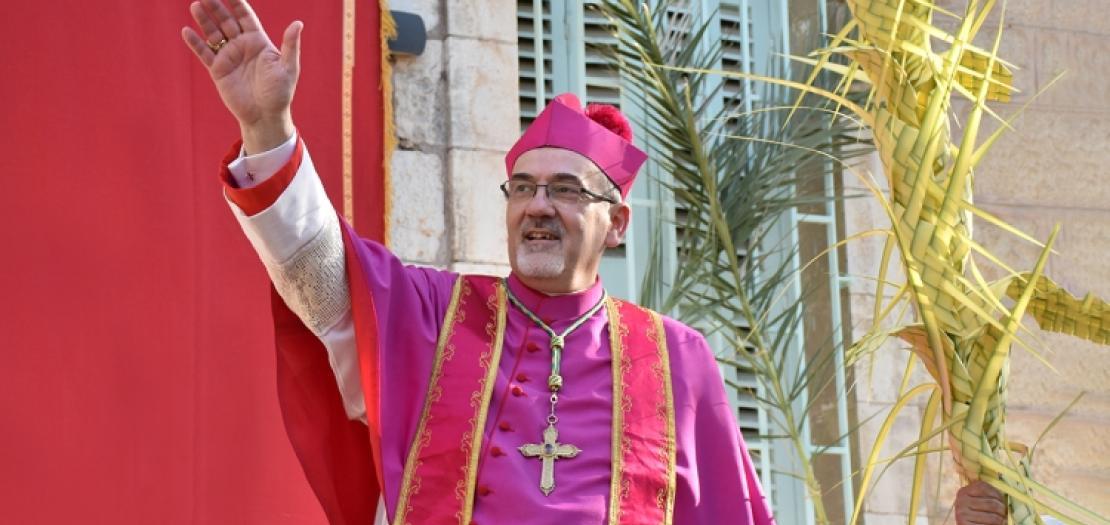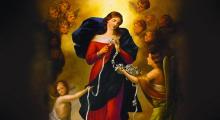Issued by the Catholic Center for Studies and Media - Jordan. Editor-in-chief Fr. Rif'at Bader - موقع أبونا abouna.org

Following is the text of the meditation by His Beatitude Cardinal Pierbattista Pizzaballa, Latin Patriarch of Jerusalem, for Plam Sunday of Lent, dated April 13, 2025:
The Gospel passage that is read at the beginning of the Palm Sunday Eucharistic Celebration (Luke 19:28-40) tells us about Jesus' entry into Jerusalem, where shortly after, he will be handed over to the Roman authorities, to be condemned and crucified.
What is special about this passage, however, is that for much of its narrative it does not so much tell us about what happens on this feast day as about its preparations. (Luke 19:29-35)
In a special way, the focus is on the mount that Jesus uses, namely a foal, which is described with two characteristics, on which we dwell.
The first characteristic is that the colt is tethered. This term appears four times within several verse,s (Lk 19:30,31,33) indicating that the disciples will find a tethered colt and will need to untie it.
It was a time when the people were in great expectation, (Cf. “Now the people were filled with expectation” (Luke 3:15) and that expectation concerned the coming of a king, a messiah who would assure peace to the people. God himself had revealed himself as the true King, but the people had insisted on having a king like all other peoples. And God had granted a king, as His representative, placed at the head of the people to assure them of peace.
But throughout biblical history, very few kings had been up to this task, capable of not being seduced by the logic of power and wealth. Instead of leading the people as a good shepherd does, untying the sheep and leading them to pasture, they had bound and oppressed the people with wrong, unjust choices. Instead of giving freedom and peace, they had brought oppression and exile to the people.
The expectation of a good king, therefore, had been growing, as had the certainty that a good king could only be an anointed, that is, God-given, king.
This is why the evangelist John precedes the account of Jesus’ triumphal entry into Jerusalem (John 12:12-15) with the account of the anointing in Bethany (John 12:1-11): Jesus is the true king, the One who comes to set his people free. Jesus therefore comes to loosen, to untie every bond of oppression, to untie his people from the power of evil, of violence, of everything that keeps man bound and incapable of true freedom.
The colt on which Jesus rides, moreover, offers an obvious reference to Zechariah’s prophecy (“Behold: your king is coming to you, a just savior is he, Humble, and riding on a donkey, on a colt, the foal of a donkey.” (Zech 9:9), which tells of the end of the wait for this meek king of peace, who finally comes, sitting on the very foal of a donkey.
The people’s expectations, however, focused mainly on prophecies that announced a triumphant, victorious, strong Messiah. The prophecy of a Messiah king riding a colt, on the other hand, was an uncomfortable prophecy, far removed from the people’s expectation criteria.
The colt Jesus sends to untie, no one had ever yet climbed (“you will find a colt tethered on which no one has ever sat”. ( Luke 19:30). History had never yet seen the coming of a king capable of paying with his own life the price for the peace of his people. Now all this happens, and a crowd of the poor rejoices. (Luke 19:37-38)
But even at the moment when the Lord wants to enter the lives of his people, and bring salvation to them, there is always something that tries to prevent him: the Pharisees, in the face of all this enthusiasm, ask Jesus to silence his disciples (“Some of the Pharisees in the crowd said to him, “Teacher, rebuke your disciples”. ( Luke 19:39)
This, however, is no longer possible: the disciples may be silent, remain mute, and this will happen during the passion, where all the enthusiasm of today will give way to dismay. But from now on even that which cannot speak, like the stones, will only say that salvation has come (“He said in reply, “I tell you, if they keep silent, the stones will cry out!” (Luke 19:40)
Man can always accept it or reject it, but Jesus goes on with his mission of salvation: the prophecy is untied and that colt, on which no one had yet ridden, has finally found the king capable of riding it.
+ Pierbattista







